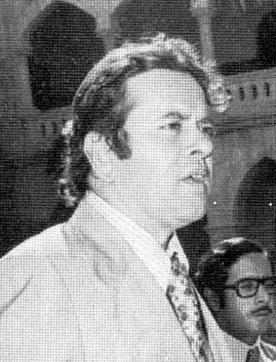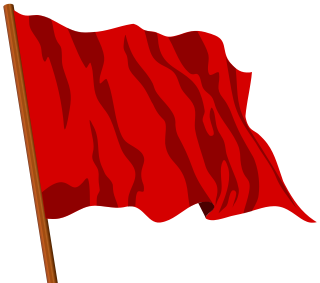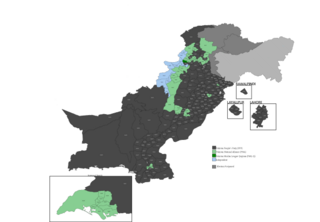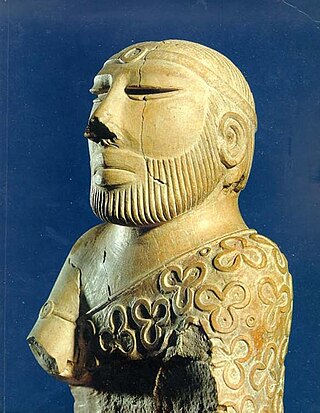This article needs additional citations for verification .(June 2012) |
| |||||
| Decades: | |||||
|---|---|---|---|---|---|
| See also: | |||||
Events from the year 1977 in Pakistan.
This article needs additional citations for verification .(June 2012) |
| |||||
| Decades: | |||||
|---|---|---|---|---|---|
| See also: | |||||
Events from the year 1977 in Pakistan.

Muhammad Zia-ul-Haq was a Pakistani military officer and politician who served as the sixth president of Pakistan from 1978 until his death. He also served as the second chief of the army staff from 1976 until his death.

Zulfikar Ali Bhutto was a Pakistani barrister, politician and statesman who served as the fourth president of Pakistan from 1971 to 1973, and later as the ninth prime minister of Pakistan from 1973 to 1977. He was the founder of the Pakistan People's Party (PPP) and served as its chairman until his execution.
Ghulam Ishaq Khan, commonly known by his initials GIK, was a Pakistani bureaucrat, politician and statesman who served as the seventh president of Pakistan from 1988 to 1993. He previously served as Chairman of the Senate from 1985 to 1988 under president Muhammad Zia-ul-Haq, and was sworn in shortly after Zia's death.

Abdul Hafeez Pirzada was a Pakistani lawyer, legal theorist, and politician, who served variously as minister for information, minister for law, minister for finance, and minister for education under president and later prime minister Zulfikar Ali Bhutto from 1971 to 1977. As law minister, he is credited as a principal draftsman of the Constitution of Pakistan, passed in 1973.

The Pakistan National Alliance, was a populist and consolidated right-wing political alliance, consisting of nine political parties of the country. Formed in 1977, the country's leading right-wing parties agreed upon to run a political campaign as a single bloc against the left oriented PPP in the 1977 general elections.

The Wali Khan faction of the National Awami Party was formed after the 1967 split in the original NAP between Maulana Bhashani and Abdul Wali Khan. The Wali Khan faction was later named National Awami Party (NAP) after the independence of Bangladesh.
The Movement for the Restoration of Democracy (MRD), Urdu: اتحاد برائے بحالی جمہوریت, was a political alliance in Pakistan founded in 1981 by the political parties opposing the military government of Muhammad Zia-ul-Haq, the sixth president of Pakistan. Headed by Benazir Bhutto of the Pakistan People's Party, its objective was the end of martial law and restoration of the democracy.
Meraj Muhammad Khan, was a well-known Pakistani socialist politician. He was noted as one of the key intellectuals and founding personalities of the Pakistan People's Party (PPP) and as a major contributor to the initial left of center/social democratic so-called Basic Programme of the Pakistan Tehreek-e-Insaf (PTI). He was also the founder of Qaumi Mahaz-i-Azadi which he founded after leaving the PPP in 1977.

Agha Iftikhar Ahmad is a Pakistani research journalist and a political activist. Ahmad started his career in 1980, after his release from jail and joined Jang Media Network and held a senior position in the Network. Ahmad is currently serving as Director of Elections, Investigations, Special Projects, and Research (EISPAR) for the Geo News Network (GNN). Iftikhar Ahmad also hosted interview show Jawab Deyh on Geo News TV channel for over 10 years.
Events from the year 1985 in Pakistan.
Events of the year 1986 in Pakistan.
Events in the year 1988 in Pakistan.
The political history of Pakistan is the narrative and analysis of political events, ideas, movements, and leaders of Pakistan. Pakistan gained independence from the United Kingdom on 14 August 1947, when the Presidencies and provinces of British India were divided by the United Kingdom, in a region which is commonly referred to as the Indian subcontinent. Since its independence, Pakistan has had a colorful yet turbulent political history at times, often characterized by martial law and inefficient leadership.

General elections were held in Pakistan on 7 March 1977 to elect 200 members of the National Assembly. They were the second general elections held in Pakistan and the first to be held after the Bangladesh Liberation War.
The 1977 Pakistani military coup was the second military coup in Pakistan that took place on 5 July 1977. It was carried out by Muhammad Zia-ul-Haq, the chief of army staff, overthrowing the government of prime minister Zulfikar Ali Bhutto.

Military coups in Pakistan began in 1958 when military officer Muhammad Ayub Khan overthrew and exiled president Iskandar Ali Mirza. Since its creation in 1947, Pakistan has spent several decades under military rule. 1947 to 2023 After their respective terms in office, each of the past five prime ministers of Pakistan has faced convictions or imprisonment. This trend highlights a significant aspect of Pakistan's political landscape: the prevailing rule that the Pakistani military exercises influence wherever it deems necessary, often persisting despite potential repercussions. Throughout Pakistan's history, the military has played a prominent role in governance, with periods where it has directly ruled the country.

General elections were held in Pakistan on 16 November 1988 to elect the members of the National Assembly and Senate.

Pakistan International Airlines Flight 326 was a domestic scheduled passenger flight that was hijacked by al-Zulfikar terrorists from 2 March to 15 March 1981. It was a routine flight scheduled from Karachi to Peshawar, but the hijackers diverted it to Kabul, Afghanistan, and then Damascus, where the hostage situation ended with the release of prisoners by the Pakistani government.
The family of head of state and government in Pakistan is an unofficial title for the family of the head of state or head of government of a country. In Pakistan, the term First Family usually refers to the head of state or head of government, and their immediate family which comprises their spouse and their descendants. In the wider context, the First Family may comprise the head of state or head of government's parents, siblings and extended relatives.